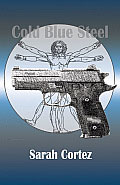Review by Jeffrey C. Alfier
Texas Review Press
Box 2146
Sam Houston State University
Huntsville, TX 77341-2146
ISBN 978-1-937875-02-2
2013, 80 pp. $10.95
www.shsu.edu
Love what can save
your life.
—Sarah Cortez, “The Secret”
As Nicholas Christopher says in his Introduction to Walk on the Wild Side: Urban American Poetry Since 1975, “American cities are physical labyrinths, and also spiritual and metaphysical ones,” and that sometimes the reflections the poet “comes upon in the depths of the maze will be from a dark mirror, or a mirror of dizzying clarity.” Houston police officer Sarah Cortez’s second compilation of poetry illuminates keenly such knowledge of the mazes and the apprehensions that accompany them.
A highly accessible writer, Cortez’s poems are crafted in short lines of carefully chosen, tight language that give urgent voice to the poems—a sense of the imperatives inherent in the dangers of police work. As poet Jack Ridl tells us, the shorter line is very American, resulting in a poetry that appeals to the working man and woman, the reader being immediately engaged without distraction. Cortez’s lines were formed in the cauldron of an American Realist tradition: hard truths told with sharp fidelity by a large city beat cop. Thus, her verse is grounded in the grueling histories of the streets, as when a patrol car ride-along witnesses her escorting officer’s death. Officers behold first-hand crimes against children, “Bruises, bites or/ burns” against a background of inherent futility: the perpetrators “getting arrested/ doesn’t change/ anyone’s rot/ or fondness for torture.” Such circumstances cannot be easily altered.
Likewise, “Investigator’s Prayer” reveals an officer’s pained helplessness in the face of crime victims, as the rape investigator
… couldn’t reach
her in whatever place
she’d found inside,
refusing to tell me
the name of her rapist.
Realism comes fast, right from the early days at the academy. There, amid structured courses, physical and academic training, a medical examiner provides cadets the harsh reality of autopsies of crime victims “[i]n the cold room/ of unclaimed bodies.” On graduation day at the academy, female grads are warned of the odds against them—even in an apparently fair and just police bureaucracy—that their new roles as police officers requires “every ounce of grit,” while new male officers are warned that the temptation to abuse their power beyond “the right/ to do a job” may come too easily.
From the first patrol, their assigned training officers lay out the realities of streets as the patrol cars traverse their tenuous circuits, where the rookies will come to know in the citizenry about them “[e]ach face hardened/ into a cold, white cipher.” In such cityscapes vigilance must be honed to a knife-edge: “Anticipation opened its fist/ inside my chest” in circumstances where reigns the “dire necessity of chambered/ rounds,” even as the officer’s honed eye closely keeps watch over the anemic pace of societal drones along the beat. Truly, the young officer will learn the incongruous reality of gaining a spit-shined image only to chase “a car burglar/ through a field of tall/ crab grass. Tripping/ falling into weeds …”
In “Awards Banquet,” where the decision to use deadly force in the performance of duties means a terrible weighing in the balance of human life, often a bittersweet victory, for perpetrators leave behind children and spouses they should have cared for. Such considerations and realities sit heavy on the mind.
Not all is danger. As in wartime, there is much drudgery and routine in patrolling, the cop’s “feet pinned to greasy asphalt.” But a quiet shift running clear of dangerous incident can be suddenly cleaved by death, the absolute imperative of the dispatcher’s voice that “times your walk into houses/ with unknown weapons.” Under such circumstances, a police officer’s work is similar to infantry patrols in foreign neighborhoods where the potential for urban combat exists. Indeed, much of Cortez’s language underscores this, as in “The Secret,” where officers perform what are called combat checks in the military:
Love whatever can save
your life. Your ballistic vest,
your razored reflexes. The
keys you rubber-banded
to keep from jingling. The
double-tied shoelaces that
won’t come loose in a foot chase.
Cortez’s lines are fresh, stark, and passionate reflections on the lives of cops and citizens alike surviving on the streets of Houston, TX, amid its “… white/ glare of mean/ neon.” Many of the poems are dedicated to her fellow officers.
The volume is not without humor, though. In “Tired, Hungry, Standing,” cops are not devoid of making sensual observations of the streets around them. In the course of their workaday lives there are multiple manifestations of comic and tragic irony. In “Yardstick,” Cortez relates how work can intrude upon even private sensual moments.
In the final poem, Cortez circles back to the beginning, concluding with a prayer for the surety of faultless justice if she herself ever proves the victim of violent crime. Thus the reader will come to know that she believes a better world, through law, is possible. No dry recital of a police blotter, Cortez’s poetry is wry, edgy, and perceptive, refusing to soften or spin a trying, yet rewarding, profession in a harsh world. The truth is blunt and rocky, and Cortez delivers. Cold Blue Steel is a marvelous achievement, and comes highly recommended.